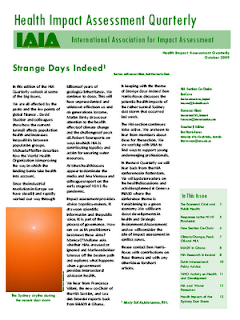From Marleen Bekker, Erasmus MC At the international HIA conference ‘On the move’ October 14, 2009 in Rotterdam, The Netherlands, a preconference workshop will move participants to reflect on, and build capacity in, agendasetting and policy impact for health.
As a practitioner applying Health Impact Assessment in policy or planning processes, or as a scientist studying design or outcomes of HIA, you may be wondering about how HIA actually helps to put public health issues on the policy or planning agenda. When is scientific, objective evidence the active substance for policy impact, and when are additional or alternative strategies needed? How do you actually build support, how do you establish the ‘right’ timing, and how do you gain access to the relevant networks of influential actors and decision-making procedures?
In a game simulation of a planning process concerning an urban renewal project, the participants explore those questions implicitly while playing different roles of parties and actors involved in urban renewal. Participants are specifically assigned to develop a strategy to set the political agenda for their different role priorities during the game. The health stakeholders could set the agenda for health either by developing an HIA or by other means. Participants are asked to play a different role than their own real-life one, which enables an individual frame reflection during the game. Afterwards, de-briefing and evaluating the game simulation enables cross-frame reflections, strengthening or renewing the knowledge and competence of participants in health advocacy.
The game simulations create a safe yet realistic setting for playing and practicing skills without repercussions. Efforts to set the agenda for health are put into the perspective of the full dynamics of such planning processes. In the games, the participants are confronted with different frames, interests and positions during and after the game. From the game simulations we may learn how a particular, realistic setting of urban planning induces effective and ineffective strategies from health proponents and non-health actors and stakeholders to put forward their interests in the planning process.Policy entrepreneurship, building effective coalitions and mobilizing power resources are emergent strategies that may be adopted alongside the HIA to move from evidence to action. This game simulation is unfreezing fixed frames, and moreover it is great fun!!!
For more information and for registration details, see
www.hia09.nl.
Marleen Bekker
 The Lancet has published six important articles on climate change and health today.
The Lancet has published six important articles on climate change and health today.














